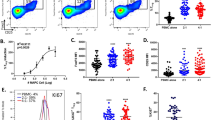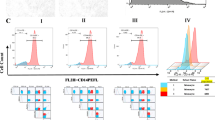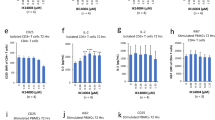Abstract
IGF-I has profound effects on the immune system. We previously reported that IGF-I promoted cord blood (CB)-naïve T-cell maturation and now show that IGF-I promoted maturation of CB monocyte–derived dendritic cells (DC) with up-regulation of CD83, CD86, CD40, and major histocompatibility complex (MHC) class II molecules, and down-regulation of mannose receptor. Furthermore, IGF-I inhibited apoptosis of CB DC and increased the production of tumor necrosis factor α (TNF-α). These effects were blocked by specific mitogen-activated protein kinase kinase (MEK) inhibitor (PD98059) and phosphoinositol 3-kinase inhibitor (LY294002). PD98059 partially inhibited the IGF-I–induced up-regulation of MHC class II. In contrast, LY294002 was additive in the IGF-I–induced up-regulation of MHC class II. Moreover, LY294002 significantly increased the percentage of late apoptotic cells in CB. These results imply the involvement of different pathways for the differential regulation of co-stimulatory molecule expression and apoptosis. The addition of anti–TNF-α did not neutralize the effects of IGF-I on CB DC maturation and apoptosis. On the contrary, neutralizing TNF-α significantly increased the IGF-I–induced up-regulation of CD83 and CD40. We conclude that IGF-I has maturation and survival effects on CB DC. These effects are mediated through both MEK and PI 3-kinase pathways but not through the IGF-I induction of TNF-α production by the DC.
Similar content being viewed by others
Log in or create a free account to read this content
Gain free access to this article, as well as selected content from this journal and more on nature.com
or
Abbreviations
- AV:
-
annexin V
- CB:
-
cord blood
- DC:
-
dendritic cells
- MEK:
-
mitogen-activated protein kinase kinase
- MHC:
-
major histocompatibility complex
- MR:
-
mannose receptor
- PI:
-
propidium iodide
- PI 3-kinase:
-
phosphoinositol-3-kinase
- TNF-α:
-
tumor necrosis factor α
REFERENCES
Wilson CB 1986 Immunologic basis for increased susceptibility of the neonate to infection. J Pediatr 108: 1–12
Wilson CB, Lewis DB 1990 Basis and implications of selectively diminished cytokine production in neonatal susceptibility to infection. Rev Infect Dis 12: S410–S420
Suen Y, Lee SM, Qian J, van de Ven C, Cairo MS 1998 Dysregulation of lymphokine production in the neonate and its impact on neonatal cell mediated immunity. Vaccine 16: 1369–1377
Tu W, Cheung PT, Lau YL 1999 IGF-I increases interferon-gamma and IL-6 mRNA expression and protein production in neonatal mononuclear cells. Pediatr Res 46: 748–754
Hunt DW, Huppertz HI, Jiang HJ, Petty RE 1994 Studies of human cord blood dendritic cells: evidence for functional immaturity. Blood 84: 4333–4343
Petty RE, Hunt DW 1998 Neonatal dendritic cells. Vaccine 16: 1378–1382
Sorg RV, Kogler G, Wernet P 1999 Identification of cord blood dendritic cells as an immature CD11c-population. Blood 93: 2302–2307
Goriely S, Vincart B, Stordeur P, Vekemans J, Willems F, Goldman M, De Wit D 2001 Deficient IL-12(p35) gene expression by dendritic cells derived from neonatal monocytes. J Immunol 166: 2141–2146
Liu E, Tu W, Law HK, Lau YL 2001 Changes of CD14 and CD1a expression in response to IL-4 and granulocyte-macrophage colony-stimulating factor are different in cord blood and adult blood monocytes. Pediatr Res 50: 184–189
Liu E, Tu W, Law HK, Lau YL 2001 Decreased yield, phenotypic expression and function of immature monocyte-derived dendritic cells in cord blood. Br J Haematol 113: 240–246
Zhou LJ, Tedder TF 1996 CD14+ blood monocytes can differentiate into functionally mature CD83+ dendritic cells. Proc Natl Acad Sci U S A 93: 2588–2592
Kooijman R, Hooghe-Peters EL, Hooghe R 1996 Prolactin, growth hormone, and insulin-like growth factor-I in the immune system. Adv Immunol 63: 377–454
Fu YK, Arkins S, Wang BS, Kelley KW 1991 A novel role of growth hormone and insulin-like growth factor-I. Priming neutrophils for superoxide anion secretion. J Immunol 146: 1602–1608
Kooijman R, Willems M, De Haas CJ, Rijkers GT, Schuurmans AL, Van Buul-Offers SC, Heijnen CJ, Zegers BJ 1992 Expression of type I insulin-like growth factor receptors on human peripheral blood mononuclear cells. Endocrinology 131: 2244–2250
Renier G, Clement I, Desfaits AC, Lambert A 1996 Direct stimulatory effect of insulin-like growth factor-I on monocyte and macrophage tumor necrosis factor-alpha production. Endocrinology 137: 4611–4618
Landreth KS, Narayanan R, Dorshkind K 1992 Insulin-like growth factor-I regulates pro-B cell differentiation. Blood 80: 1207–1212
Gibson LF, Piktel D, Landreth KS 1993 Insulin-like growth factor-I potentiates expansion of interleukin-7-dependent pro-B cells. Blood 82: 3005–3011
Kimata H, Fujimoto M 1994 Growth hormone and insulin-like growth factor I induce immunoglobulin (Ig)E and IgG4 production by human B cells. J Exp Med 180: 727–732
Johnson EW, Jones LA, Kozak RW 1992 Expression and function of insulin-like growth factor receptors on anti-CD3-activated human T lymphocytes. J Immunol 148: 63–71
Tu W, Zhang DK, Cheung PT, Tsao SW, Lau YL 1999 Effect of insulin-like growth factor 1 on PHA-stimulated cord blood mononuclear cell telomerase activity. Br J Haematol 104: 785–794
Tu W, Cheung PT, Lau YL 2000 Insulin-like growth factor 1 promotes cord blood T cell maturation and inhibits its spontaneous and phytohemagglutinin-induced apoptosis through different mechanisms. J Immunol 165: 1331–1336
Czech MP 1989 Signal transmission by the insulin-like growth factors. Cell 59: 235–238
Rubin R, Baserga R 1995 Insulin-like growth factor-I receptor. Its role in cell proliferation, apoptosis, and tumorigenicity. Lab Invest 73: 311–331
Myers MG, Sun XJ, Cheatham B, Jachna BR, Glasheen EM, Backer JM, White MF 1993 IRS-1 is a common element in insulin and insulin-like growth factor-I signaling to the phosphatidylinositol 3′-kinase. Endocrinology 132: 1421–1430
Sasaoka T, Rose DW, Jhun BH, Saltiel AR, Draznin B, Olefsky JM 1994 Evidence for a functional role of Shc proteins in mitogenic signaling induced by insulin, insulin-like growth factor-1, and epidermal growth factor. J Biol Chem 269: 13689–13694
Cobb MH, Goldsmith EJ 1995 How MAP kinases are regulated. J Biol Chem 270: 14843–14846
Parrizas M, Saltiel AR, LeRoith D 1997 Insulin-like growth factor I inhibits apoptosis using the phosphatidylinositol 3′-kinase and mitogen-activated protein kinase pathways. J Biol Chem 272: 154–161
Minshall C, Arkins S, Dantzer R, Freund GG, Kelley KW 1999 Phosphatidylinositol 3′-kinase, but not S6-kinase, is required for insulin-like growth factor-I and IL-4 to maintain expression of Bcl-2 and promote survival of myeloid progenitors. J Immunol 162: 4542–4549
Minshall C, Arkins S, Freund GG, Kelley KW 1996 Requirement for phosphatidylinositol 3′-kinase to protect hemopoietic progenitors against apoptosis depends upon the extracellular survival factor. J Immunol 156: 939–947
Minshall C, Arkins S, Straza J, Conners J, Dantzer R, Freund GG, Kelley KW 1997 IL-4 and insulin-like growth factor-I inhibit the decline in Bcl-2 and promote the survival of IL-3-deprived myeloid progenitors. J Immunol 159: 1225–1232
Parrizas M, LeRoith D 1997 Insulin-like growth factor 1 inhibition of apoptosis is associated with increased expression of bcl-xL gene product. Endocrinology 138: 1355–1358
Rescigno M, Martino M, Sutherland CL, Gold MR, Ricciardi-Castagnoli P 1998 Dendritic cell survival and maturation are regulated by different signaling pathways. J Exp Med 188: 2175–2180
Ardeshna KM, Pizzey AR, Devereux S, Khwaja A 2000 The PI3 kinase, p38 SAP kinase, and NF-kappaB signal transduction pathways are involved in the survival and maturation of lipopolysaccharide-stimulated human monocyte-derived dendritic cells. Blood 96: 1039–1046
Sato K, Nagayama H, Tadokoro K, Juji T, Takahashi TA 1999 Extracellular signal-regulated kinase, stress-activated protein kinase/c-Jun N-terminal kinase, and p38mapk are involved in IL-10-mediated selective repression of TNF-alpha-induced activation and maturation of human peripheral blood monocyte-derived dendritic cells. J Immunol 162: 3865–3872
Heemskerk VH, Daemen MA, Buurman WA 1999 Insulin-like growth factor-1 (IGF-I) and growth hormone (GH) in immunity and inflammation. Cytokine Growth Factor Rev 10: 5–14
Banchereau J, Briere F, Caux C, Davoust J, Lebecque S, Liu YJ, Pulendran B, Palucka K 2000 Immunobiology of dendritic cells. Annu Rev Immunol 18: 767–811
Romani N, Reider D, Heuer M, Ebner S, Kampgen E, Eibl B, Niederwieser D, Schuler G 1996 Generation of mature dendritic cells from human blood. An improved method with special regard to clinical applicability. J Immunol Methods 196: 137–151
Montaner LJ, da Silva RP, Sun J, Sutterwala S, Hollinshead M, Vaux D, Gordon S 1999 Type 1 and type 2 cytokine regulation of macrophage endocytosis: differential activation by IL-4/IL-13 as opposed to IFN-gamma or IL-10. J Immunol 162: 4606–4613
Kjeken R, Mousavi SA, Brech A, Griffiths G, Berg T 2001 Wortmannin-sensitive trafficking steps in the endocytic pathway in rat liver endothelial cells. Biochem J 357: 497–503
Kulik G, Weber MJ 1998 Akt-dependent and -independent survival signaling pathways utilized by insulin-like growth factor I. Mol Cell Biol 18: 6711–6718
Kooijman R, Coppens A, Hooghe-Peters E 2002 IGF-I inhibits spontaneous apoptosis in human granulocytes. Endocrinology 143: 1206–1212
Kulik G, Klippel A, Weber MJ 1997 Antiapoptotic signalling by the insulin-like growth factor I receptor, phosphatidylinositol 3-kinase, and Akt. Mol Cell Biol 17: 1595–1606
Wong BR, Josien R, Lee SY, Sauter B, Li HL, Steinman RM, Choi Y 1997 TRANCE (tumor necrosis factor [TNF]-related activation-induced cytokine), a new TNF family member predominantly expressed in T cells, is a dendritic cell-specific survival factor. J Exp Med 186: 2075–2080
Josien R, Wong BR, Li HL, Steinman RM, Choi Y 1999 TRANCE, a TNF family member, is differentially expressed on T cell subsets and induces cytokine production in dendritic cells. J Immunol 162: 2562–2568
Puig-Kröger A, Relloso M, Fernandez-Capetillo O, Zubiaga A, Silva A, Bernabeu C, Corbi AL 2001 Extracellular signal-regulated protein kinase signaling pathway negatively regulates the phenotypic and functional maturation of monocyte-derived human dendritic cells. Blood 98: 2175–2182
Venters HD, Dantzer R, Kelley KW 2000 Tumor necrosis factor-alpha induces neuronal death by silencing survival signals generated by the type I insulin-like growth factor receptor. Ann N Y Acad Sci 917: 210–220
Acknowledgements
The authors thank the staff of the labor ward, Tsan Yuk Hospital, in facilitating the collection of cord blood.
Author information
Authors and Affiliations
Corresponding author
Additional information
Supported, in part, by a grant from the Research Grants Council of the Hong Kong Special Administrative Region, China (RCG#HKU-7260/01M) and Committee on Research and Conference Grants, The University of Hong Kong.
Rights and permissions
About this article
Cite this article
Liu, E., Law, H. & Lau, YL. Insulin-Like Growth Factor I Promotes Maturation and Inhibits Apoptosis of Immature Cord Blood Monocyte–Derived Dendritic Cells through MEK and PI 3-Kinase Pathways. Pediatr Res 54, 919–925 (2003). https://doi.org/10.1203/01.PDR.0000088067.04673.1B
Received:
Accepted:
Issue date:
DOI: https://doi.org/10.1203/01.PDR.0000088067.04673.1B
This article is cited by
-
Phosphatidylinositol-3-kinase activity during in vitro dendritic cell generation determines suppressive or stimulatory capacity
Immunologic Research (2011)
-
Transcription factors in the control of dendritic cell life cycle
Immunologic Research (2007)



